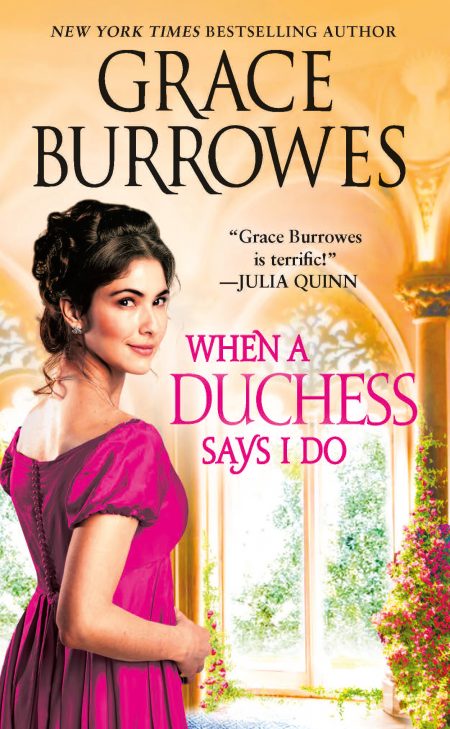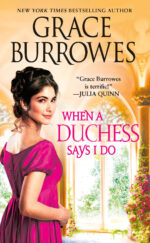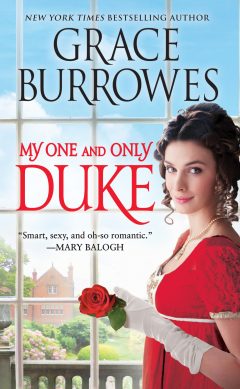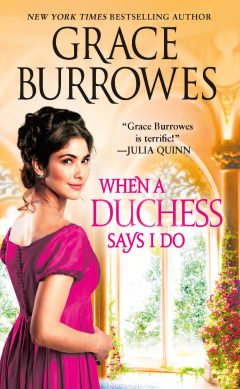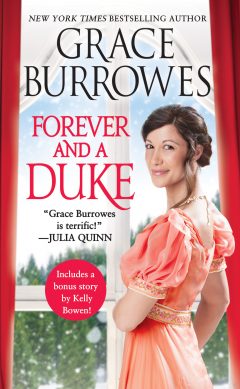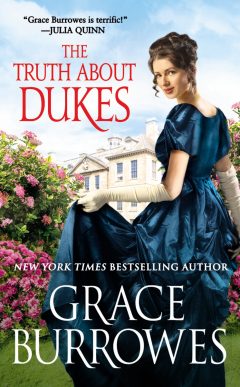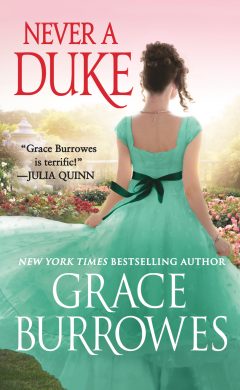When a Duchess Says I Do
Book 2 in the Rogues to Riches series
Duncan Wentworth tried his hand at rescuing a damsel in distress once long ago, and he’s vowed he’ll never make that mistake again. Nonetheless, when he comes across Matilda Wakefield in the poacher-infested and far-from-enchanted woods of his estate, decency compels him to offer aid to a lady fallen on hard times. Matilda is whip-smart, she can read Duncan’s horrible penmanship, and when she wears his reading glasses, all Duncan can think about is naughty Latin poetry.
Matilda cannot entrust her secrets to Duncan without embroiling him in the problems that sent her fleeing from London, but neither can she ignore a man who’s honorable, a brilliant chess player, and maddeningly kissable. She needs to stay one step ahead of the enemies pursuing her, though she longs to fall into Duncan’s arms. Duncan swears he has traded in his shining armor for a country gentleman’s muddy boots, but to win the fair maid, he’ll have to ride into battle one more time.
Enjoy An Excerpt







Chapter One
The rabbit’s heaving sides testified to a battle lost, a soul surrendering to death.
Duncan Wentworth remained amid the trees, studying the creature where it lay at the edge of the clearing, a strip of thin leather noosed around a furry back foot. The little beast had been caught on a game run between Brightwell’s home wood and the river, where sunny banks were still green with the last of the fall grass.
The rabbit twitched at a disturbance from the direction of the village, though the snare made flight impossible. Even struggling against captivity might result in a permanent injury, so delicate were the creature’s bones.
A stout, bare-headed fellow in rough garb emerged into the clearing.
“Now aren’t you a fine, fat coney,” the man muttered. “Just the right size to fill up a goodwife’s stewpot.”
A poacher, the bane of every English landowner’s acres, and not a poacher on the verge of starvation.
“I told Jeffrey the bunnies love their clover, didn’t I?” he went on. “Too bad for you, little varmint.” He knelt by the rabbit, a serious length of knife gleaming in his hand. “Say your prayers, stupid beast, for you’ve had your last meal. Off to market with you, or my name’s not Herman Treacher.”
Duncan stepped into the clearing. “A moment, if you please, Mr. Treacher.”
Treacher heaved to his feet, the knife held before his ample gut. “You’re on private property, sir, and sneaking up on an armed man is never smart.”
He was faster than he looked, and he clearly knew to watch Duncan’s hands. A career thug, then, rather than a countryman supplementing his means through crime.
Duncan took up a lean against the nearest sapling, an oak struggling to find sunlight amid the mature specimens. The rabbit had been too desperate for nourishment to sense a trap. Tomorrow, a hound or a fox might put an end to such an unwary creature.
Nevertheless, these were Duncan’s woods. He’d sought their tranquility as an antidote to months of posturing among London’s good society. That Treacher would foil Duncan’s plan was the last straw on the back of a camel noted for surliness on a good day.
“As it happens,” Duncan said, “we’re both on private property, though only one of us is trespassing.”
Treacher tossed the knife from hand to hand, a rudimentary distraction Duncan knew better than to watch.
“I’m the one holding the weapon, guv. I’d say that makes you the uninvited guest at the party. Run along, and I’ll be about my business.”
Not bloody likely. Poaching in a forest was a capital offense. If Treacher had any sense, he’d dispatch the witness before finishing off the rabbit.
Alas for Treacher, that scheme did not fit with Duncan’s plans.
The rabbit growled, a sound Duncan hadn’t heard since his youth. Treacher was startled into focusing on his prey for the single instant necessary for Duncan to kick the knife free and tackle the blighter.
Duncan lacked his opponent’s brawn, but he’d spent years brawling as only a minister’s wayward charge could brawl. He had Treacher facedown in the clearing, a beefy arm hiked halfway up his back, when a sharp point prodded Duncan between his shoulder blades.
“Let him up, your worship, and I might let you live. Insist on more foolishness, and yon coney won’t be the only one going to his reward today.”
Well, of course. The senior officer had arrived, and Duncan’s failure to anticipate that development meant he deserved the bother of defending his rabbit against two criminals.
He’d been too ready to use his fists, too ready to take out his frustrations on any willing fool. Without letting up the pressure on Treacher’s arm, Duncan glanced over his shoulder. Assailant number two was smaller and in possession of an equally shiny, sharp knife. The larger knife lay two feet to Duncan’s left—convenient, because he was left-handed—and could easily be collected as Duncan got to his feet.
The rabbit remained caught, a careless animal, but possessed of enough self-respect to growl at a bad fate. So too, would Duncan give these imbeciles a better fight than they were expecting.
“Get him off me, Jeffy. Bastard’s about to break me arm.”
Not break, dislocate. The challenge was to achieve that aim, grab the knife, rise, turn, and deal with Jeffrey all without stepping on the rabbit. First, Duncan would affect the posture of a man defeated and in fear for his life. Second, he’d—
“Drop the knife.” This voice was feminine, annoyed, and a surprise.
“Says who?” Jeffrey asked.
“A woman holding a gun,” Duncan replied. “And from the look in her eyes, I’d say she knows what to do with it. Madam, good day. Duncan Wentworth at your service, though I apologize for the lack of a proper introduction. A pleasure to make your acquaintance.”
She had dark eyes, probably brown when viewed from bowing-over-her-hand distance. Her hair was the rich hue of mink in summer, her figure on the gaunt side of trim, and she was of barely medium height. She put Duncan in mind of the rabbit—small, spare, ready to bolt.
The lady was not pretty—her looks were too dramatic for that. Defined brows, a determined chin, cheekbones made a tad too prominent by her thinness. She was attractive, though. Holding that gun with an air of impatient disgust, she was undeniably attractive.
“Dammit, Herm,” Jeffrey said, stepping from behind Duncan. “You’ve gone and snagged the bleedin’ property owner. You said he was a London gent what never wastes his time in the shires.”
“Drop the knife,” the woman said, her tone that of a governess on her last nerve. “Now.”
“I’d do as the lady says.” Duncan rose and collected the weapon Treacher had lost in the undergrowth. “Then you’d be well advised to run like the demons of hell are in pursuit.” He tested the blade against the pad of his thumb. “Just a suggestion.”
Jeffrey dropped the knife, even showing enough sense to cast it a few feet away, rather than attempt any dramatics.
Treacher struggled to his feet, cradling his right arm. “Let’s leg it, Jeffy. This was all your idea—nobody else would think to poach in a haunted woods, you said. Now me arm’s half busted, and we haven’t got no rabbit, and the swell is making threats.”
The lady sidled around the clearing, putting herself between the rabbit and the men. The barrel of her gun—a nasty coaching pistol that could easily have brought down a horse—remained marvelously steady in her grip.
“Au revoir, gentlemen,” Duncan said, stepping to the lady’s side. He was ready to let this pair go for now; he was not ready to see the woman dart back into the woods along with the rabbit and the poachers.
Treacher cast one longing glance at the snared rabbit and lumbered off into the trees, Jeffrey following silently.
The woman dropped to her knees beside the rabbit. “We have to let it go. I need the knife, provided it’s sharp.” She sounded frantic to free the rabbit, though her hand smoothing its fur was gentle. “Do something, please.”
“Have a care,” Duncan replied. “If you inspire the beast to struggling, it can break its own leg, or, worse, mangle that back foot. What’s needed is calm.”
A set of pliers would have come in handy, but the home farm was a good half mile off, and carrying the rabbit, snare and all, such a distance would never serve.
Duncan considered the situation and the woman. She was not a girl, fresh from the schoolroom. He’d spent years in schoolrooms, as both pupil and teacher, and she hadn’t the look of one whose life had been indentured to book learning. Her cloak was velvet and well made, though the hem was dusty and one button was missing near her waist.
She wore no gloves and her hands were clean, though what manner of lady carried a loaded gun when strolling through a peaceful wood?
“The snare is secured by a stake driven into the ground,” Duncan said. “I’ll attempt to lift the stake free so we have some purchase to unknot the leather from the rabbit’s foot. All must be done slowly and without agitation to the captive.”
“You’ve done this before.”
“Many times.” Though not recently, more’s the pity. When he’d freed the snare from its stake, Duncan produced his own knife—much smaller than the poachers’ weapons—and used the tip to work at the knotted leather.
The rabbit bore this all with stoic calm, or perhaps the lady’s soft caresses soothed its little heart. Her scent distracted Duncan, meadow grass with a hint of pine smoke, not a fragrance he’d find in a Mayfair ballroom, but pleasant.
Sturdy and fresh rather than feminine.
“That’s it,” he said, when the knife point had loosened the noose about the rabbit’s foot. “Another moment, and—”
The ruddy little wretch used powerful hind legs to shove itself away from the noose before Duncan could get his knife out of rabbit-range. The point of the blade scored the flesh of his wrist, ripping through the cuff of his shirt and creating a bloody mess.
The rabbit darted across the clearing, paused long enough to whump a foot against the earth, then disappeared into the bracken.
“Warning his mates,” Duncan said, tugging one-handed at his cravat. “Some thanks for a heroic rescue.”
“Let me,” the woman said, batting his hand aside. She withdrew the pin from Duncan’s linen and soon had his neckcloth off. “Was your knife clean?”
“Yes. Though if your concern is infection, I should probably pour the contents of my flask over the wound before you bind it.”
His flask was in the inner right-hand pocket of his coat, which meant her assistance was necessary to produce it, lest Duncan get blood all over his London tailoring. He didn’t give a damn for fashion, but wasting money was, in his estimation, among the deadliest sins. Wasting time trumped even that offense.
The lady knew what she was about with an injury, and applied a quantity of brandy to the wound. Duncan’s vision dimmed and his ears roared, though the sensation of her hand on his shoulder, and her quiet “Steady on,” penetrated the fire raging along the wound.
“Considering that you’ve arguably saved my life,” Duncan said, as she wrapped his cravat about his wrist, “might you spare me your name?”
She used his cravat pin to secure the bandage tightly enough to suppress further bleeding without causing discomfort. His blood stained the white linen, though the stain wasn’t spreading. A flesh wound, thank God. If Duncan had lost his life to an ungrateful rabbit, his cousins in Mayfair would have laughed at his graveside.
“You should thoroughly clean that wound,” the lady said. “Strong spirits are helpful, but honey would have been more effective. Promise me you won’t neglect it.”
“The wound will be healed before I can neglect it.” Wentworths were tough. They healed well and quickly, on the outside. “You’re in my woods, alone, where all manner of ruffians apparently lurk. Might I escort you to your destination?”
She collected her pistol and the shorter knife, passing the longer one to Duncan. “That won’t be necessary. Tell your gamekeepers what you came across this morning. Those were professional poachers, not a pair of farm lads trying to add a little meat to their mama’s stores.”
Just like that, she was prepared to leave him in the middle of the woods.
“My thanks, then, for your timely intervention, but I truly must have a name for so brave a rescuer.”
“No, you must not. You are the owner of Brightwell?”
“I have that honor.” Or that challenge. Cousin Quinn’s sense of humor was complicated and given to irony.
Duncan’s ownership of Brightwell looked to be a further annoyance to her, as if she’d found not one but two sets of poachers in her woods. She shoved her pistol into a pocket of her cloak, shook out her hems, and—incongruously, for a woman possessed of both a knife and a gun—bobbed a curtsy.
“I’ll bid you good day. Please see a physician for that wound.”
Duncan would do no such thing. The damned scratch had bled copiously, which always boded well for a swift recovery, and physicians cost money.
“Before you abandon a wounded man alone in the wilds of Berkshire,” Duncan said, “won’t you tell me if I’ve found the ghost in my gatehouse?”
***
A lady’s education was a sore hindrance when she needed to curse. Duncan Wentworth was the soul of courtesy, though, so even if Matilda had known some vile oaths, she might not have used them in his presence.
Might not. Life had become unpredictable, and Matilda’s reactions and choices unpredictable as well.
“Both your gatehouse and your woods are haunted?” The compulsion to flee had her heart beating like the snared rabbit’s, but she’d seen the speed with which Mr. Wentworth could move. One moment, he’d been a gentleman at his leisure, lounging against a tree. The next instant, Treacher’s knife had flown through air, and Treacher had been facedown in the bracken.
“I cannot speak for the spirits inhabiting my home wood.” Mr. Wentworth picked up his battered felt hat and slapped it against his thigh. “If I were a clever poacher, I’d put about word that Brightwell’s forest was haunted, and then add credence to the rumor by carrying a lit torch down the game trails on a moonless night. Some truant boy tippling his papa’s brandy would recite a tale of ghosts to his friends in the schoolyard, and lo, my woods are haunted.”
He’d more or less divined Matilda’s scheme. “And your gatehouse, Mr. Wentworth?”
He ripped the leather noose from the stake, stuffed the cord in his pocket, and threw the stake in the direction of the river. A wet plop followed, though the river was a good twenty yards on.
“My gatehouse is uninhabited, like the rest of my outbuildings. I came up the drive last night after moonrise, and what should I see but smoke drifting from the chimney. No lamps lit, the windows shuttered, but clearly, somebody in residence.”
He noticed smoke by moonlight. I really must learn to curse. “Perhaps Jeffrey and Mr. Treacher availed themselves of your hospitality.”
Mr. Wentworth put Matilda in mind of the leather that had snared the rabbit. Lean, supple, and strong, though his strength would be hard to discern beneath fine tailoring and society manners. He noticed his surroundings, and thus Matilda nearly hated him.
“Perhaps you will avail yourself of my hospitality,” he said. “I am new to the area and would acquaint myself with a neighbor whose timely appearance spared me a good deal of bother.”
I am not your neighbor. “It was of no moment, Mr. Wentworth.” I frequently take the air in woods I don’t own and wave a pistol at ruffians. “I really must be going. Good day.”
She gathered her skirts and would have moved off toward the river, but Mr. Wentworth’s hand on her arm stayed her.
“I must insist, madam. Midday has arrived, and I neglected to break my fast. My cook will be wroth with me if I similarly disregard my luncheon. You did me a great service, and the least I can do is offer you some sustenance.”
His invitation balanced a vague plea with a vaguer threat. Matilda did not believe the plea for one moment, no matter the sincerity in his blue eyes.
She didn’t dare ignore the threat, however, not when he could have her arrested for breaking and entering. With that air of gravitas, he’d easily convince the magistrate that Matilda had been intent on poaching.
Then too, his threat came with an offer of free food.
By tonight, she’d be ten miles away, though she had hoped to winter at Brightwell. The property had belonged to an aging duke who’d died without sons. She and Papa had visited the duke years ago, making Brightwell a regular stop on their summer travels. His Grace would part with a painting in exchange for a manuscript or figurine, and Papa would come away richer for having imposed on ducal hospitality for a fortnight.
In the past week, Brightwell’s gatehouse had been a sanctuary, though, of course, Matilda was trespassing. Another activity for which a lady’s education hadn’t prepared her.
While Matilda sorted through options and mentally bemoaned a lack of criminal skills, Mr. Wentworth pretended to admire the autumn foliage. He was tall, brown-haired, and looked of a piece with the trees shedding the last remnants of their summer finery. Matilda put him at “indisputably mature.” Well north of thirty, still south of forty. He would age well and slowly, and most women would consider him handsome.
Matilda considered him a serious problem.
“The house is in that direction,” he said, gesturing away from the river. “The day is cold enough to justify a toddy, though I’m also in the mood for beef and barley soup. My tastes are not refined, which doubtless drives Cook to despair.”
Oh, ye winged seraphs. A hot, spicy, restorative dose of spirits, a steaming bowl of beef stew…Matilda’s feet started moving without her giving them permission to do so. She hadn’t had fresh bread in weeks, hadn’t had butter since losing her post at the inn.
“I cannot stay long, Mr. Wentworth.”
“All the ladies say that, which is a polite way to remind me that I’m poor company. I set a humble table, my conversation is dull, and my favorite society is that of long-dead philosophers. You may limit yourself to two bites of ham and a single spoonful of compote, then be on your way, if you’re still awake. Ladies have been known to catch up on their slumber when assigned to be my dinner companion.”
He was making a jest of himself, though Matilda found no humor in his remarks. Desperation did this—stole humor, rest, pleasure, all the blessings in life. Then came autumn, when pilfering by moonlight from neglected gardens was no longer possible and orchards were stripped of their fruit. Every ounce of Matilda’s energy was often spent piling up deadfall to burn at night.
Her plan—take a job in service, save money, and eventually take passage from England—had turned out to be no plan at all.
“I have bored you already,” Mr. Wentworth said. “I’d discuss the weather, but that strikes me as belaboring the obvious when in the out-of-doors.”
“Tell me what brings you here from London.”
“How can you tell I’ve come from London?”
Oh… piffle. “You arrived last night from somewhere. Your attire—but for your hat—is exquisite. One assumes your clothing came from London even if you did not.”
She had all but admitted that she recognized Bond Street tailoring—woefully foolish of her.
“I originally hail from Yorkshire,” he said. “Several years ago I moved to London to be with family, and until last month I considered London my home.”
They emerged from the trees into the park that stretched from Brightwell’s back terraces. The formal gardens were a wreck, separated by overgrown hedges and punctuated with toppled statuary and cracked urns. For several mornings past, Matilda had found peace behind these hedges.
“A metaphor of some sort,” Mr. Wentworth said, surveying his gardens.
Despite the sunshine, the scene was melancholy. Dead leaves carpeted overgrown beds, lichens encroached on the walls, and the scent of wood smoke hung in the air. Winter approached with the relentlessness of funeral cortege.
“Some would say these gardens are romantic,” Matilda replied. A lady’s attempt at conversation.
“Some would be idiots. The cost alone…but one doesn’t discuss finances. I promised you a meal. This way.”
He set a brisk pace down the gravel walk, no pretense of matching his steps to Matilda’s or offering an unneeded arm for her to lean on. She had no grasp of foul language. Mr. Wentworth, she concluded, had little gift for social dissembling.
A fine quality in a man. She’d learned too late to appreciate it.
He led her to a door that opened onto a wide stairway landing. A flight of steps descended into what Matilda knew to be the kitchens, cellars, and pantries; another flight led up to the floor that housed many of the public rooms—parlors, library, music room, gallery.
Between the sun beaming through the tall windows, and the heat wafting up from the kitchens, the space was blessedly, wonderfully warm.
“May I take your cloak?” Mr. Wentworth asked.
Matilda did not want to part with her cloak. Her dress was decent enough—she’d traded away her Paris finery within a week of leaving home—but with every item of clothing she removed, she became easier to describe. A purple velvet cloak was simple to identify. Pair that with a gray wool dress trimmed with lace at the collar, plain cuffs, half boots with frayed and knotted laces, and she became a specific woman, with specific people looking for her.
Mr. Wentworth’s steady gaze suggested he knew all of that, and lying would be pointless. Matilda unfastened the frogs of her cloak.
“One does wonder how Brightwell came to be yours,” she said. “The house has good bones, and the locals recall it as a lovely property.”
“The locals who claim more than their threescore and ten years, perhaps. The estate was imposed on me. The dining room is this way.”
An evasive answer, which cheered Matilda. A man with secrets was less of a threat to a woman with secrets. She followed Mr. Wentworth down a corridor free of dust and cobwebs, and equally devoid of art, furniture, or flowers.
“The previous caretaker all but looted the place,” Mr. Wentworth said, ushering her into a small parlor. “The excuse of record is that assets were liquidated to pay expenses, but what expenses does an empty house incur? Fortunately, the thieves hadn’t grown bold enough to help themselves to larger items of furniture, and they were too ignorant to steal the best of the art.”
What would Mr. Wentworth think of a woman who’d stolen apples, eggs, beans, and other produce?
That question was rendered irrelevant by the scent of fresh bread, beef stew, and cloved ham. Hunger had made Matilda’s senses sharper and turned Mr. Wentworth’s “humble table” into a feast.
“Ladies first,” he said, pouring water from an ewer by the hearth into a porcelain basin on a side table. Linen cloths had been arranged in a quarter-fan beside the basin, and for the first time in weeks, Matilda prepared to wash her hands in warm water.
“I ought by rights to send you to a guest room for this ritual,” Mr. Wentworth said, “but my staff wasn’t expecting company.”
While Matilda washed her hands and surreptitiously patted a warm, damp cloth against her cheeks and brow—bliss without limit—Mr. Wentworth went to the door and addressed somebody who remained in the corridor.
Matilda’s host washed his hands, as a footman set a second place, bowed, and withdrew. Mr. Wentworth had no sooner seated her than a maid bustled in carrying a quilted shawl lined with flannel.
He took the garment from the maid and draped it around Matilda’s shoulders. Somebody had hung the shawl near a hearth, for the flannel was warm.
She hadn’t eaten for three days. She hadn’t rested well for weeks. She hadn’t been truly comfortable in an eternity, and the sheer delight of a warmed shawl nearly had her in tears.
“Let’s start with the soup, shall we?” Mr. Wentworth said, ladling Matilda a generous portion. He set the bowl before her, and for a moment, she wallowed in the sensation of steam wafting up to her chin. The scent was hearty, the taste…oh, the taste. Salty—salt was necessary for life—rich, aromatic, with a hint of some spice. Tarragon, perhaps, though pepper was well represented too.
Matilda consumed her food slowly because she’d learned what came of gorging after a fast. Mr. Wentworth ate prodigious portions, though his manners were fastidious. The meal should have been awkward—a lady did not dine in a gentleman’s exclusive company, much less with a gentleman to whom she hadn’t been introduced.
A lady also did not have to debate whether to shiver all night or waste another day’s energy collecting wood. She never viewed winter as a mortal enemy, never stared at some farmwife’s laundry while considering whether to commit larceny. Ladies were lucky creatures.
“Another roll?” Mr. Wentworth asked, holding up a basket.
“No, thank you.”
When Mr. Wentworth went to the sideboard for a second helping of ham, Matilda secreted a pair of buttered rolls in her dress pocket. If she’d been told that each roll consumed meant spending a month of the year in the underworld, she could not have given them up.
She managed to purloin a thick slice of ham to go with the rolls, but forced herself to stop at that. Of the pear compote, she took only three bites—sweets were dangerous on a deprived stomach—but she had two cups of hot China black tea, perhaps the most fortifying aspect of the whole meal.
She was contemplating a third cup when Mr. Wentworth rose and brought a plate of tea cakes to the table.
“I have a sweet tooth,” he said, as if confessing a penchant for excessive wagering. “If you are similarly afflicted, take all you like now. The rest will not go to waste.”
He moved around the end of the table, pausing by the door. Did his wrist pain him? He’d certainly eaten with dispatch, and had not relied on a footman to serve them. Many gentry maintained only a minimal staff, though Mr. Wentworth struck Matilda as something other than—more than?—gentry.
He’d not asked her any more personal questions, which was fortunate. All Matilda had to offer him was a widow-in-difficulties story that he’d recognize as a hastily concocted fiction. He resumed his seat at the head of the table and poured himself another cup of tea. “I trust you enjoyed the meal?”
“Very much. Your Cook is to be commended.” And if this was his idea of humble fare, then what menu would he put forth for a dinner party?
“And you are warm enough?”
What was he up to? “I am quite comfortable, and I thank you for your hospitality, Mr. Wentworth, though I must be on my way. The meal—despite the irregular circumstances—was much appreciated.”
And please God, would he seek the company of his dead philosophers rather than escort her from the property? Her belongings, meager though they were, were at the gatehouse, and she could not leave the area without retrieving them.
She tried for a gracious smile, though doubtless, desperation shone from her eyes.
Mr. Wentworth ran a finger around the rim of his wineglass. “The door to this dining parlor is locked, madam. No servant will intrude. You have the privacy of the confessional, more or less, and I suggest you use it to your advantage. My first footman has retrieved a haversack from the gatehouse containing a few effects such as a lady fallen on difficult times might possess. My best guess is that you intended to steal the poached rabbit from the snare, but I ruined your plans.”
Oh…Perdition. The key was in the lock—Mr. Wentworth hadn’t locked her in so much as he’d locked his staff out. The impropriety of that gesture was equaled only by the perceptiveness that had inspired it.
Matilda could dash his wine into his eyes—a tavern maid had taught her that trick—and bolt, but her cloak was somewhere in the house, as were her belongings. Decamping without them would be mortal folly.
She could fall to weeping and spin a tale, though Mr. Wentworth did not strike her as susceptible to tears.
She could offer her rehearsed story and leaven it with a bit of truth. A pickpocket had explained to her that a little honesty made the mendacity more convincing. The child could not have been more than eight years old, but had had good health to show for his light fingers and lying.
“I thought I could kill the rabbit before the poachers returned,” Matilda said. “I couldn’t do it. I stood in the trees for a good quarter hour, arguing with myself. Then you showed up in the shadows at the edge of the clearing.” The small recitation left a lump in her throat, not because holding a gun on armed men had been upsetting—she’d very nearly gloried in those moments, and that was upsetting—but because the rabbit had gone free.
She’d been spared the terrible decision to kill the rabbit, and the little creature had gone free.
Mr. Wentworth poured her a third, hot, lovely cup of tea. “A tender heart can be an endless burden. Do go on.”
Chapter Two
Duncan’s wrist throbbed, and such was the inconvenience of his injury that even lifting a teapot worsened the pain. More fool he, for using a sharp blade in the vicinity of a desperate creature—two desperate creatures. The lady had eaten with the measured focus of the newly starving, and her hands had trembled through her first and second cups of tea.
“I might be able to shoot game roaming freely,” she said, “but to see that poor beast ensnared…and that was my fault, you see.”
“You set the snare?”
She dropped a small lump of sugar into her tea, the first he’d seen her sweeten her drink. “I disturbed the rabbit on my rambles and drove it into the snare.”
Her afflictions included a conscience in addition to a tender heart, and yet, she’d stuffed a gun into the pocket of her cape and buttered rolls in the pockets of her dress. The part of Duncan that had delighted in the novelty and variety of the Continental capitals took notice of that.
She was interesting, an anomalous element in an otherwise dreary landscape of responsibility and drudgery. Damn Cousin Quinn for his dubious generosity anyway.
“Shall I ring for more tea?” Duncan asked.
“No, thank you. I must be going.”
“Madam, you must be staying. My footman’s mother’s knees are aching, incontrovertible proof that our first snow of the year will soon arrive. The temperature dropped even during the two hours I spent inspecting my home wood.”
Two hours devoted to avoiding the home farm, the gardens, the dairy, the laundry, the tenants, the vicar, the vicar’s nosy wife…
“Then the sooner I’m on my way, the better.” She cradled the teacup in her hands, as if she’d take the warmth rather than the sustenance with her.
“That I cannot allow. You are a guest in my home and, I suspect, a damsel in distress. Permit me to impersonate a knight errant and set right what I can.”
Every sensible knight knew that damsels in distress merited aid so that they might take their problems, drama, and difficulties elsewhere. Duncan did not want this woman to leave, though, which was very bad of him.
She was an antidote to boredom, a distraction from the weight of resentment. When Quinn’s next letter arrived asking for a progress report, Duncan could reply that his home wood had become a hotbed of violence and intrigue, with armed felons and intrepid maidens lurking behind every tree.
Though of course, that would bring dear Quinn charging up the drive, for the Wentworth family would not allow Duncan to hoard drama for his own entertainment.
Then too, the lady might not be a maiden, though that didn’t signify.
“I am loath to impose,” she said, hunching over her teacup. “You have been most generous already.”
She did not set aside her last cup of tea, rise, and curtsy, and Duncan knew why. That locked door, the blazing fire in the hearth, the evidence of a hearty midday meal, made this cozy dining parlor a haven from the cruelty of a harsh world. She longed for sanctuary, which yearning he would exploit shamelessly to ensure she didn’t take a precipitous leave of him.
“I have merely provided a meal from stores that are more than ample. You, on the other hand, provided timely intervention at a delicate moment. I am in your debt, and Wentworths always repay their obligations.”
Duncan had been about five seconds away from disabling the first poacher and disarming his mate, but a moral creature would need a morally sound reason to accept aid.
“I would have done the same for anybody,” she said. “It’s nothing.”
Duncan had been careful not to touch his guest, other than to drape the quilted shawl about her shoulders. He hadn’t offered his arm as they’d paraded through his ruin of a garden, hadn’t bowed over the lady’s hand, hadn’t helped her to remove her cloak.
Now, he patted her wrist, which was alarmingly boney. “My life, while insignificant in the greater scheme, is not nothing. I could even now be lying in that clearing, a knife in my ribs, blood pooling beneath me. My fate might have been a painful expiration from loss of blood, or the more protracted agony of succumbing to the elements. My assailants would never have been held accountable, and then I’d have had no choice but to truly haunt that forest.”
Her hands cradling the teacup were too thin, the veins a blue tracery beneath pale skin. Her smile, though, was a study in warmth. Her whole face became illuminated, her gaze softening, her mouth curving to reveal straight, white teeth. Her smile conveyed shared delight and a tantalizing hint of mischief.
“You have a dramatic imagination, Mr. Wentworth.”
Stephen Wentworth, Duncan’s sole pupil for the past five years, claimed Duncan had no imagination whatsoever.
Stephen was apparently wrong for once. “I will use that imagination to conjure lurid tales of the horrors facing a woman alone in this benighted shire. Foul weather and vexatious felons are the least among them. Am I to stop at the posting inn on the London road next month to learn that a strange lady was found frozen in some cow byre, the very woman who today saved my life?”
Duncan was not afflicted with a tender heart—not anymore—but he had a thriving horror of waste. That he should rattle around in a house with fourteen bedrooms while this woman sought warmth among the livestock was an affront to common sense.
And be damned to propriety. He was a preacher’s nephew—that couldn’t be helped—but also a Wentworth.
She set aside her tea, which had to be tepid by now. “Sheep byres are warmer. The ceilings are lower, the beasts less skittish, and they leave tufts of wool…”
She fell silent. In the north those tufts of wool were called hentilagets. Poor children gathered them up from the hedges and brambles, to be spun into yarn and knitted into stockings. Duncan could well recall the coarse, greasy feel of the wool, the tenacity of the thorns, and the delight he’d taken in the coin earned.
Though Uncle had decreed that the money had to go into the poor box, and Duncan had lost his enthusiasm for gathering wool from ovine sources.
“Let me help you,” he said. “Better still, why don’t you help me?”
Ah, that piqued her attention. She regarded him with the wary uncertainty of a woman whose opinion of men had acquired some tarnish, or possibly a thorough coating of rust.
“In what capacity could you need aid?”
“I am a scholar of modest intellect, and in recent years, I’ve traveled much on the Continent. I’d like to transcribe my notes for eventual publication.” Though, thanks to dear Cousin Quinn—may he choke on his strawberry leaf coronet—Duncan had no time to work on his transcriptions.
“You need an amanuensis? A secretary?”
“Badly. My penmanship is abominable. If you have a lady’s hand, then you are the perfect resource to aid me.” An imaginative fabrication, once again proving that Cousin Stephen was an idiot.
She set a tea cake draped with lemon icing on her plate. “What would my wages be?”
Duncan named a modest figure, not low enough to be insulting, not high enough to raise her guard any higher than she’d already raised it.
“Plus room and board, of course,” he said. “We will share our mealtimes, that we might discuss the work without intruding on the rest of the day.”
She took a bite of her lemon cake, closing her eyes as if the nectar of the gods graced her palate. Duncan helped himself to a raspberry cake when he realized he was watching to see if she’d smile at him again.
“I will take supper with you,” she said. “Breakfast will be a tray in my room, lunch will likely be a tray in your library. You do have a library?”
“Largely devoid of books, but yes.” Books were fungible, like small tables, lamps, carpets, and silver. “Do you speak French?”
“I do. I haven’t used it in some time.”
How careful she was. “Other languages?”
“Enough Italian to stumble through a libretto, thanks to a solid foundation in Latin. Functional German. Good conversational Russian, though my command of the written language is wanting.”
He had the sense she’d not disclosed the whole of her skills, but she’d said enough. She was either well traveled or well educated, possibly both.
A diplomat’s daughter?
“You are ideally suited to assist me. I’ll have my housekeeper, Mrs. Newbury, give you a tour of the premises, such as they are, and show you to a guest room. We can commence work tomorrow after breakfast.”
Duncan braced himself for effusions of gratitude, though really, what did it matter to him if one more hearth was lit or one more mouth fed? Restoring Brightwell on the terms Quinn had set out was an impossible challenge, and a few coppers in either direction were of little moment. Doubtless Duncan’s new amanuensis would soon decamp for parts unknown in any event.
The lady finished with her lemon cake and drank the last of her tea. “I can find my way to the kitchens, Mr. Wentworth. I’ll doubtless locate the housekeeper somewhere in the same vicinity. Was there anything else you wanted to say?”
How extraordinary. She, who likely hadn’t had a decent meal in weeks, was dismissing him.
“I have two questions, and you will answer them honestly or my offer of employment will be rescinded.”
She put another lemon cake on her plate. “Ask.”
“Are you married?”
“I am not.” Thank God. The words hung in the air, a world of relief unspoken. She’d run from her own family, then, or from the king’s justice.
“What is your name?” Duncan asked.
She rose, and the tea cake was no longer on her plate. In her pocket, then, and Duncan hadn’t seen her purloin the sweet.
“You may call me…Miss Maddie.”
“As in Madeline?”
“Miss Maddie will do.”
Duncan got to his feet as well, because a gentleman did, and because he wanted to beat her to the door. “I can’t write out a bank draft to Miss Maddie.”
“Then pay me in cash.” She twisted the key, slipped through the door, and was off down the corridor.
Duncan stood outside the parlor long enough to make sure Miss Maddie took the steps to the kitchens, then he returned to the table, collected the remaining tea cakes, and prepared to locate some of the notes he’d taken while touring the Continent.
They were on the premises somewhere—had he instructed the staff to put them in the estate office?—and he had until tomorrow morning to find them.
***
The staff was either well trained or desperately attached to their wages, because thirty minutes after stuffing herself at the lunch table, Matilda sank into the first hot bath she’d had in far too long. She even washed her hair, because God knew when such an opportunity might befall her again.
Mrs. Newbury, a statuesque woman of African descent, had declared that touring the premises could wait until Mr. Wentworth’s guest was properly settled. She’d left Matilda a brown velvet dress with an old-fashioned high waist. What the garment lacked in stylishness it made up for in sheer comfort and warmth.
A tap on the door interrupted Matilda’s inspection of her guest room. “Come in.”
“Beg pardon for intruding, ma’am,” the maid said. “I’m to see if you need anything, and set them buckets out in the corridor for the footmen.” Her speech carried a hint of the Dales: set ’em bookets out in t’corridor.
“You’re not interrupting anything,” Matilda said. “You’re from Yorkshire, aren’t you?”
The girl, a sturdy blonde, scooped two buckets from the tub. “Aye, ma’am. Mrs. Newbury says them as are from the north are good workers. Mr. Wentworth were raised in Yorkshire.” She carried the water out and returned with a pair of empty buckets.
“Mr. Wentworth has only recently acquired Brightwell?”
“Aye. Had it from his cousin, who had it from the old duke. Place went to rack and ruin, Mrs. Newbury says, but Mr. Wentworth will set it to rights, see if he don’t. The tenant farms are right enow. Mr. Manner’s ma’s knees say we’re in for snow.”
She brought in two more empty buckets, filled them, and placed them in the corridor as well.
“Do you know when the laundry will be finished with my dress?” Matilda asked.
“We do laundry on Monday, like a proper household. Mrs. Newbury is in the attics now finding you some more outfits. We’ve dresses up there to clothe half of London. I’ll send along a tea tray, shall I?”
She pushed the wheeled tub toward the door, going slowly enough that the remaining water wouldn’t slosh.
“Don’t put yourself to any bother,” Matilda said.
“Tea’s no bother. Himself rings for trays at all hours, and now, when a proper body ought to be inside before a roaring fire, where is he? Mucking about in the garden. The Quality is daft, though you didn’t hear that from me.”
“What is your name?” The question was hard to ask, because Matilda had learned that parting with a name was an act of trust.
“Danvers, ma’am. I’m the upstairs maid, now that we have a guest, and you mustn’t think anything of me. I’m a chatterbox.”
The girl was friendly, as contented staff could be in the homes of gentry.
“A tea tray in another hour or so would be appreciated.” Small, frequent meals were easier on a recovering belly than feasts. That wisdom had come from the laundresses at the tavern where Matilda had tried to work. She’d been let go for falling asleep on the job one too many times.
The other women at the inn had done what they could for her. One had gifted her with a pair of wool stockings, a few had pressed hard-earned pennies into her hand, but they’d all known that turning an inept maid out with winter coming on was tantamount to a death sentence.
And still, Matilda had not turned her steps in the direction of home.
She closed the door behind Danvers and went to the window. Down in the garden, a man in a floppy felt hat used a long-handled scythe to hack away at the overgrown shrubbery. With each sweep of his blade, more of the unkempt hedge fell to the cold ground. Mr. Wentworth worked with the unhurried, efficient rhythm of a countryman, and gradually fashioned a border where rioting bushes had been.
“That is not the physique of a scholar,” Matilda murmured, for he wore no coat. Soldiers had that lean, tough build. Coachmen had the same ability to ignore the elements, even as isolated flakes of snow drifted down from a pewter sky.
The swing of Mr. Wentworth’s scythe was entrancing, like the cadenced narrative of a skilled storyteller. Why had he offered her sanctuary? She was a damsel at death’s door, and he’d conjured a pretext for adding her to his household.
If the past months had taught Matilda anything, it was that good luck always came at a price, while bad luck was free. Beggars could be choosers, though, and despite every instinct telling her to take her buttered rolls and her pilfered tea cake and run, she’d stay at least the night.
In the morning, after a sound sleep in a warm bed, she’d find the fortitude to leave this place and never come back.
***
“So you’ve banished Duncan to the shires?” Stephen Wentworth asked.
Quinn gave no sign he’d heard the question, but then, Quinn was holding the baby, a fat little cherub by the name of Artemis Ann Wentworth. Wee Artie had two older sisters to lead her astray, though Stephen intended to shoulder a doting uncle’s portion of that effort as well.
“I haven’t banished anybody anywhere,” Quinn replied. “Take the baby.”
Stephen found two stone of grinning, drooling, Wentworth female deposited upon his lap.
“Greetings, niece. Be kind to me now, and in fifteen years, I’ll teach you how to tipple brandy.”
“You’ll do no such thing,” Quinn growled, prowling off across the playroom. “How long can it take one duchess to change her dress?”
“You’re my only begotten brother,” Stephen replied, bouncing the baby on his good knee. Actually, both of his knees were good. The problem that consigned him to a wheeled chair for much of the day was lower, halfway between his left knee and ankle. “Jane is giving you time to deliver your homily about the perils of young manhood.”
“Which sound advice you regularly ignore. Will you visit Duncan on this trip?”
The instant Stephen paused in his bouncing, the baby waved her arms. Typical Wentworth, always instigating.
“I haven’t been invited out to Brightwell, probably because Duncan got a bellyful of my company on the Continent and has only had six months to recover from years of travel. What is Duncan doing out in Berkshire, anyway?” Stephen lifted the baby overhead—not so high, when a man was seated—and the little beast grinned uproariously.
“Drop that baby,” Quinn said, extracting a rubber ball from the toy chest, “and I won’t get a chance to kill you because Jane and the aunties will see to the job before the child has ceased squalling. The nursery maids will feed your carcass to the dogs, and Ned will carve your headstone.”
“How I treasure the comfort of familial affection,” Stephen replied, cradling the baby against his chest. “From what I recall, you set the tenant properties at Brightwell to rights and broke the entail so you could sell the place.”
Outside, the weather was threatening nastiness. Fools with two sound legs might consider the first snowfall beautiful, while Stephen hated snow. He’d made the journey from Paris back to London in part because traveling after winter set in was tantamount to torture. Unlike Duncan, Stephen hadn’t remained in Merry Olde once the Season had ended. He’d popped in at his own estate for one excruciatingly boring week, then taken himself back to the safety of the Continent, where Jane’s matchmaking wasn’t a threat to a young man’s sanity.
“I did break the entail at Brightwell,” Quinn said, tossing the ball against the wall with one hand and catching it with the other. “Duncan showed no interest in commerce, and Jane thought he needed to be where he had some interaction with people other than family and servants.”
Jane was a dear woman who thrived on a challenge—witness, she’d married the head of the Wentworth family—but she didn’t know Duncan as Stephen knew him.
“She means well,” Stephen said, turning the baby upside down—slowly—then righting her. “But Duncan’s version of good society is Socrates or Marcus Lugubrious. I dragged our cousin to coffee shops all over the Continent, sat him down in the middle of lively arguments about everything from American government to abolition, to the analgesic properties of intoxicants, and do you know what he did?”
The baby wiggled in Stephen’s lap, stretching out her arms toward her papa. Quinn lobbed the ball into the toy chest, retrieved his daughter, and headed for the door.
“Let’s repair to the library before I break another sconce.”
As children, neither Quinn nor Stephen had had toys. Anything they’d acquired that might have diverted them—a tattered deck of cards, an old hat—had quickly been destroyed by a father fonder of gin than he’d been of his own children.
“Was the sconce lit when you broke it, Quinn?”
“One of them was.” Quinn opened the library door and preceded Stephen inside. “If you dragged Duncan to a coffee shop, he probably sat in a corner—close enough to a lamp to have some light, far enough from the fire to avoid anybody’s notice—and read some damned book, while you made fourteen new best friends and beggared yourself buying them all drinks.”
Not exactly. Stephen had learned that young Englishmen intent on making a good impression earned only contempt and a sore head with that tactic.
“Duncan truly doesn’t enjoy the comradery of his fellows.” This baffled Stephen, who found the company of other people one of few comforts in the midst of chronic pain.
“He didn’t enjoy the company of your fellows,” Quinn said. “Young men intent on wenching and inebriation.”
A man in a wheeled chair was not seen as a man, but rather as an outsized child, his gender relevant only insofar as the fellow must be decently dressed. Stephen had come to this conclusion before his sixteenth birthday and had been forcing himself to walk periodically ever since.
The only person to support him in that endeavor had been Duncan, and Duncan hadn’t needed any mortifying explanations either.
“Quinn, I’m no longer eighteen. I am of an age to marry, in line to inherit your title until such time as you present me with a nephew, and yet, you insist on thinking of me as a university boy consumed by lust. Is it possible—let’s call this a wild theory—that your view of Duncan is similarly misguided?”
Quinn put the baby to his shoulder and rubbed the child’s tiny back. The duke’s hand was nearly large enough to cover that back, and yet his touch could not have been more gentle.
“It’s possible I do not see any of my family clearly. Jane instructs me on that point regularly, but I knew Duncan as a lad—he was the older cousin who tried to help, but hadn’t the means. I am beholden to him.”
For a Wentworth, a personal debt was a more sacred obligation than any tax owed to the king or tithe owed to the church.
“You owe him, so you disown him?”
For years, Duncan had fought for Stephen, though his firearm of choice had been reason and his longbow nocked with relentless determination. Because of Duncan, Quinn had installed a lift in the family’s London town house. Because of Duncan, Stephen had been given the freedom of the saddle, a medication Stephen still relied on in frequent large doses.
To advocate for Duncan, however ineffectively, felt good.
“We are not disowning him, Stephen. In all of your wanderings, did Duncan ever show a friendly interest in a woman?”
Oh, for God’s sake. “He never showed a friendly interest in another person, Quinn, though he’s inexplicably tolerant of children and dumb beasts. People are specimens to him, an experiment in progress, a chess puzzle. His near acquaintances are the classical philosophers, his greatest recreation is to sit of an evening with a glass of brandy and stare into a modest fire as it burns down to coals. You torment him when you force him into the society of squires and goodwives.”
“Jane disagrees with you,” Quinn said, kissing the baby’s fuzzy head. “Jane says he’s lonely, and that we’ll soon lose him to endless travel if he’s not given an opportunity to form some meaningful associations.”
Jane was a preacher’s daughter and had a way with a sermon. “You disagree with Jane.”
The look Quinn shot Stephen was exasperated and wonderfully honest. That glance was sent from one adult brother to another, allies in the ongoing investigation of the Great Feminine Mystery.
“I have suggested to my duchess that Duncan’s version of happiness does not comport with her theory.”
“Which suggestion, Jane batted aside like a new maid going after cobwebs, but there’s our Duncan, in godforsaken Berkshire, surrounded by the racing crowd, the hunt set, and the farmers’ daughters who’d love to marry into a ducal family.”
The baby got a fist wrapped in Quinn’s hair. No gray there yet, but then Quinn was only in his mid-thirties. If anything, he seemed younger now than he had ten years ago.
While Duncan had always seemed grown-up. Not lonely, exactly, but inured to life.
“I compromised with my duchess,” Quinn said. “Duncan has one year to make the estate profitable, after which I will take over management of the property for him. If at the end of one year, he has not brought Brightwell up to scratch, then management of the property remains in his hands, though I will hold a life estate.”
Quinn was big, dark, unfashionably prone to muscle, and easy to mistake for a bullyboy in fine tailoring. He’d used that perception to his advantage when establishing his bank, and he could drop into the persona of a thief-taker at will.
He was also shrewd in a way Stephen had never had to be. Quinn could bargain with the devil and come away with his soul intact. The same negotiation would have left Stephen with a new boon companion.
“And because of that life estate,” Stephen said, “Duncan cannot easily sell the property. Either he learns to manage Brightwell in the next year, or he learns to manage it over the next decade—if he wants to escape back to his travels. Is this kind, Quinn? Even schoolboys eventually win free of having to study topics they abhor.”
Quinn settled onto the sofa with the child in his lap. “Duncan has more than enough brains to bring Brightwell ’round. All he wants is motivation to accomplish the task. What does the future hold for him otherwise? Another five years touring the Continent with some spoiled lordling?”
“Many men have a worthwhile career as tutors,” Stephen said, a career he’d consider but for his damned leg.
“Those men are not our cousins. Jane wants Duncan settled. If he gets Brightwell sorted out in the next year, then he can lark about wherever he pleases.”
“I’d best pay a call on him,” Stephen said. “I know a bit about managing a property, which affliction we must also lay at dear Jane’s feet.”
She’d prevailed on Quinn to give Stephen a modest estate when Stephen had turned twenty-one, because, in Jane’s estimation, a young man needed his own quarters. This was Jane’s euphemism for ensuring Stephen’s dubious friends and paramours did not disturb the ducal household.
“You own the best property of the lot,” Quinn said. “Also the smallest acreage. Althea and Constance wanted more distance from London and needed a challenge.”
Althea and Constance, Stephen’s older sisters, wanted dowering, in other words, and productive land was the sweetest asset a doting brother could add to the marriage settlements.
Both sisters remained unmarried, despite having dowries overflowing with sweetness.
“I do thank you for your generosity,” Stephen said, though was it generous to exile a fellow upon his majority? “The Continent is endlessly fascinating, but one wearies of wandering.” For a time, then one wearied of staying put. “I’ll trot off to Berkshire in the morning.”
“You’ll mount a sneak attack?”
Duncan had lived with the ducal branch of the family for years—when there had been money, but no title—and yet, in some ways, Duncan was still apparently a stranger to some of his cousins.
“I could send him a note, Quinn, but if he was in the middle of a good book, he’d shrug, set the note aside, and neglect to inform his housekeeper. Did you know he sought to publish a travelogue of our itinerary?”
“Everybody is publishing travelogues.”
And Quinn, who had not learned to read until early adulthood, had no time for literature that merely entertained and broadened the mind. He could glean more about a person from examining their ledger book than any priest had ever learned in a confessional, but Quinn had probably never read a complete work of fiction.
“Do you read anything other than the bank reports, Quinn?”
“I read to the children.” He nuzzled the baby’s nape. “I like poetry. Some poetry.”
That made sense. “Poetry doesn’t take thousands of words to tell a story.”
“Exactly. Poetry doesn’t muck about, it gets straight to the point and does in twenty lines what Duncan’s philosophers couldn’t sort out as well in an entire book.”
“So have you memorized a poem to spring on Jane?”
Quinn rose again, the child cradled against his chest. “Speaking of Jane, she must have decided to wedge in a nap along with changing her dress. Before you leave for your missionary work in Berkshire, stay a few days and let Jane cosset you. The girls and I could use the reinforcements.”
He quit the room on that admission, the baby waving a damp fist at Stephen over her papa’s shoulder.
Duncan might not be lonely, but Stephen certainly was. He left a volume of Wordsworth’s poetry so “The Daffodils” was open on the low table before the hearth—Quinn’s preferred end of the sofa—and sent a footman to inform the stables that he’d ride for Berkshire in the morning.
Order your copy of When A Duchess Says I Do!
End of Excerpt
When a Duchess Says I Do is available in the following formats:
- Barnes & Noble Nook
- Kobo
- Apple Books
- Amazon Kindle
Digital:
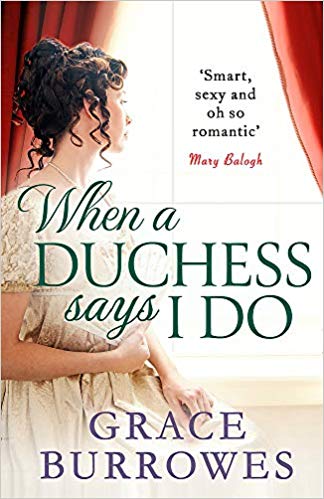
- Waterstones
- Kobo UK
- Amazon UK
- Amazon Kindle UK
United Kingdom:
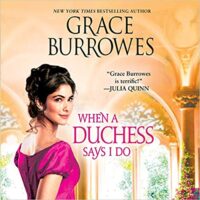
- Bookshop
- Apple Books
- Libro.fm
- Audible
- Amazon Audio
- AudiobooksNow
- Books-A-Million
- Chirp
- Hoopla
- Kobo
- Nook Audiobooks
Audio:
For those who patronize public libraries, this title has also been uploaded to Overdrive, Hoopla, Baker & Taylor, and many other library channels. You can see the full list of library distributors here.
Listen to a Snippet:
Connected Books
When a Duchess Says I Do is Book 2 in the Rogues to Riches series. The full series reading order is as follows:
- A Rogue in Winter
- Book 1: My One and Only Duke
- Book 2: When a Duchess Says I Do
- Book 3: Forever and a Duke
- Book 4: A Duke by Any Other Name
- Book 5: The Truth About Dukes
- Book 6: How to Catch a Duke
- Book 7: Never a Duke







